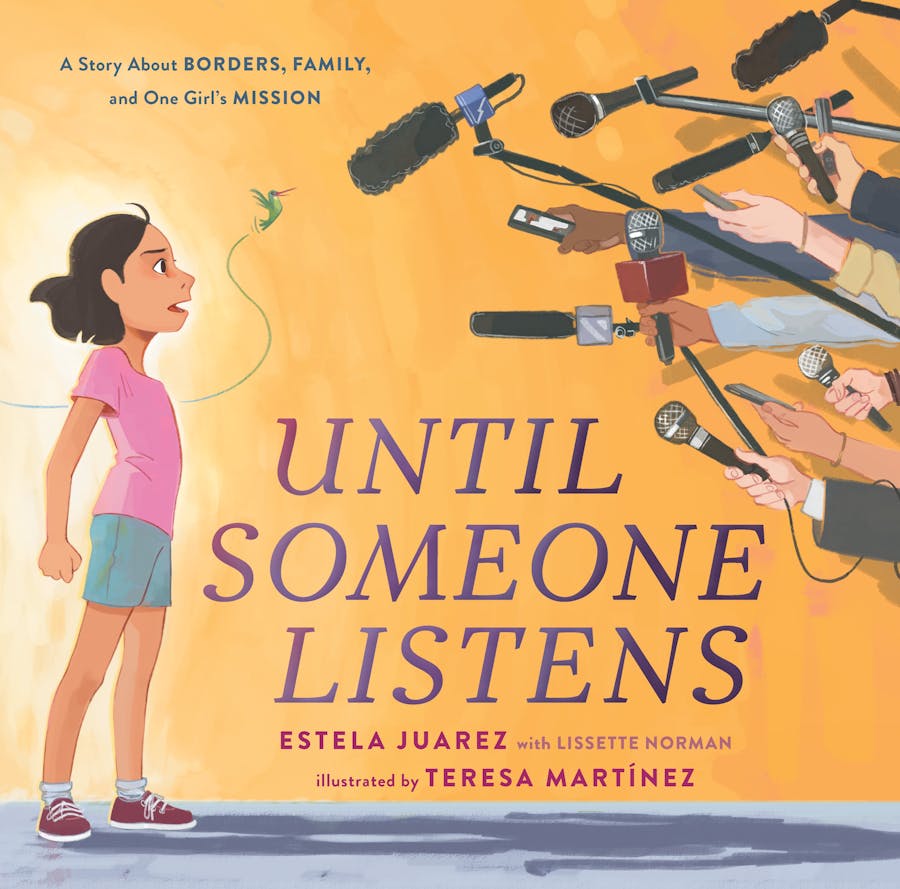 Until Someone Listens: A Story About Borders, Family, and One Girl’s Mission
Until Someone Listens: A Story About Borders, Family, and One Girl’s Mission
Written by Estela Juarez with Lissette Norman
Illustrated by Teresa Martínez
Roaring Brook Press, 2022, 32 pp (unpaged)
ISBN: 9781250832122
Spanish edition: Hasta que alguien me escuche
This emotional autobiographical account is written in the voice of a child whose mother was deported to Mexico when she was eight years old. Estela’s mother came to the U.S. as a teen to attend school and work, eventually marrying a U.S. marine and having two daughters who live together in “a house full of love.” When her mother is forced to return to Mexico, Estela is devastated and her family is distraught, feeling as if “someone ripped us in half.” Because Estela was especially close to her mother, her father finally takes Estela to Mexico for a year so she can be with her mother. The support of her family leads Estela to write letters to government officials and newspapers and speak at public forums “until someone listens.” Estela directly states her theme of discovering that “my words have power” and that “families should end up how they started—together.” The book takes a clear stance on speaking out against injustice.
The digital illustrations by Teresa Martínez use color to convey the changing emotions of Estela and her family. Warm colors of yellows and oranges full of sun and light fill the pages depicting the family togetherness, while cool blues and purples create scribbled shadows on pages highlighting separation. One particularly poignant page depicts Estela huddling on the floor, with her sad eyes staring out at the reader. A hummingbird appears throughout the book as a symbol of the mother’s love and energy and the hope of the family being together.
A two-page author’s note provides background information about the family’s story and five-year ordeal until the mother is temporarily allowed to reunite with her husband and children in the U.S. in 2021, indicating that the family’s story is still in process. The author’s note makes clear how presidential politics in different administrations affected her mother’s deportation. Estela’s words in the book are direct in describing the impact and confusion of immigration policies and the overwhelming emotions experienced by loving families separated by these policies.
This picturebook can be paired with other picturebooks about the separation and detention of families, such as Hear My Voice/Escucha mi voz, edited by William Binford (2021) that highlights the voices of migrant children in detention centers at the border and Mama’s Nightingale: A Story of Immigration and Separation by Edwidge Danticat and Leslie Staub (2015) about a child who takes action when her Haitian immigrant mother is put in a detention center. Mango Moon by Diane De Anda and Sue Cornelison (2019) is in the voice of a child whose father has been taken to a detention center and faces deportation to Mexico. Families separated by borders is the theme of Between Us & Abuela by Mitali Perkins and Sara Palacios (2019) about a family who goes to the border to visit their Abuela, separated by the border wall, and A Sky without Lines by Krystia Basil and Laura Borràs (2020) in which a child dreams of flying through the open sky to see his mother and brother across the border. One other interesting pairing is My Name is Bana by Bana Alabed and Nez Riaz (2021), an autobiographical picturebook of a Syrian girl who escapes Aleppo and documents the war for social media.
Estela Juarez wrote this book with assistance from Lissette Norman when she was thirteen-years-old. Her acknowledgements also name other people who supported her in her efforts to publish this book.
Lissette Norman is an Afro-Dominican poet and picturebook editor, who has written several picturebooks, including Plátanos Go with Everything/Los plátanos van con todo (Sara Palacios, 2023).
Teresa Martínez is a picturebook illustrator who lives in Puerto Vallarta, Mexico and has illustrated other books including Mi Ciudad Sings (Cynthia Harmony, 2022) and Playing at the Border: A Story of Yo-Yo Ma (Joanna Ho, 2021).
Kathy G. Short, University of Arizona
© 2023 by Kathy G. Short

